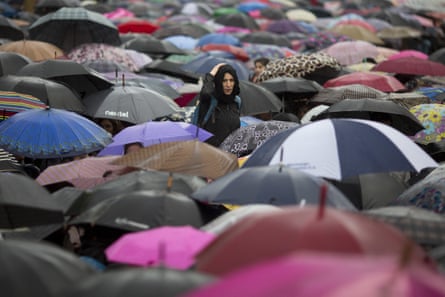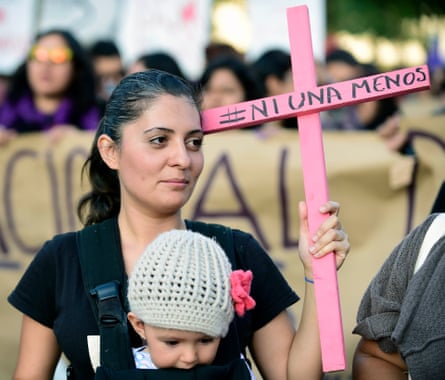The crowd of women packed into the historic square of Plaza de Mayo in downtown Buenos Aires under the freezing rain was so vast that some had to close their umbrellas to all fit together. “Machismo Kills,” read the hand-painted sign held aloft by one young woman.
Tens of thousands of women marched here on Wednesday to protest the growing problem of violence against women in Argentina, a problem so prevalent that the country sanctioned a law four years ago legally defining as “femicide” cases of domestic violence, so-called “honour” killings and other categories of hate crimes against women.

The Buenos Aires march was matched by others across Argentina and other South American countries, after women’s groups called for solidarity via social media under the hashtags #NiUnaMenos (“Not one less”, meaning not one more woman lost to male violence) and #BlackWednesday.
“This is a march against femicide,” supreme court judge Elena Highton de
Nolasco told the press on the eve of the march. “Cases of femicide are
growing in number, they are becoming more violent, more perverse – we even
had the news today that there have been 19 femicides in the last 18 days.”

“Walking home I want to feel free, not brave,” read another sign by one of the marchers on Wednesday.
“I came because they are killing women who could be my sisters, my friends,” said one young marcher.
Similar marches were held in all of Argentina’s main cities, while the Ni Una Menos movement transcended the country’s borders. Demonstrations also took place in Mexico, El Salvador, Bolivia, Chile, Paraguay and Uruguay.

The protest was prompted by the abduction of Lucía Pérez, a schoolgirl who was drugged, raped and tortured earlier this month in the coastal city of Mar del Plata.
The cruelty of her attack was such that Pérez suffered a cardiac arrest, according to prosecutor María Isabel Sánchez, who described it as “an act of inhuman sexual aggression”.
Following their assault, the assailants washed the 16-year-old in an attempt to erase forensic evidence and took her to a nearby hospital, where she died shortly after arrival from internal injuries sustained during her rape.
“I know it’s not very professional to say this, but I’m a mother and a woman, and though I’ve seen thousands of cases in my career, I’ve never seen anything like this,” prosecutor Sánchez told local media.
But Pérez’s murder is just the latest in a harrowing sequence of “femicides”, crimes usually committed by husbands, boyfriends, family members or acquaintances of the victim. In more than one case, the woman has been set on fire by her partner.

The unrelenting series of killings led Michelle Bachelet, president of
neighbouring Chile, to post a video on Twitter saying that similar cases of
violence in her own country “have led me to join Ni Una Menos, the social
movement born in Argentina, which expresses the frustration felt by our own
compatriots at the cases of violence against women and girls”.
Every 30 hours in Argentina a woman is killed in such crimes, according to statistics kept by La Casa del Encuentro, an NGO that helps female victims of violence.
